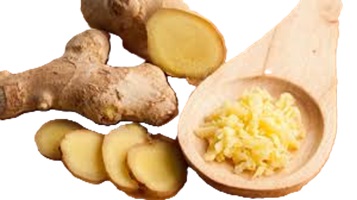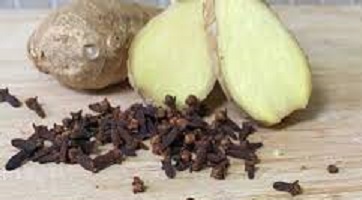Ginger Benefits: All You Need to Know
Ginger Benefits: All You Need to Know
Consuming ginger can help reduce bloating and intestinal gas by decreasing fermentation and relieving constipation.
Additionally, ginger is rich in antioxidants, which are crucial in protecting cells from damage.

These antioxidants help control free radicals, which are harmful compounds that can cause cellular wear and tear when present in excessive amounts.
Ginger Benefits: About Ginger
Ginger, scientifically known as Zingiber officinale, is a flowering plant whose rhizome (commonly referred to as ginger root) is widely used as a spice and in traditional medicine.
Native to Southeast Asia, ginger has been cultivated for thousands of years and is a staple in many cuisines around the world.
Key Characteristics of Ginger:
Appearance: Ginger root is knobby and has a pale brown skin with a yellowish interior. It has a strong, pungent aroma and a spicy, slightly sweet taste.
Forms: Ginger can be used fresh, dried, powdered, or as an oil or juice. It’s also available in extract form and as a supplement in capsules.
Active Compounds: The most notable bioactive compound in ginger is gingerol, which is responsible for many of its medicinal properties.
Ginger also contains shogaols, parasols, and zingerone, which contribute to its flavor and health benefits.
Culinary Uses:
Flavoring: Ginger is used to add flavor to a wide variety of dishes, from savory curries and soups to sweet desserts and beverages. It’s a key ingredient in many Asian cuisines, such as Indian, Chinese, and Thai.
Beverages: Ginger tea is a popular drink, often consumed to soothe digestive issues or cold symptoms. Ginger ale is another well-known beverage, though often it contains only ginger flavoring rather than actual ginger.
Medicinal Uses:
Digestive Health: Ginger is commonly used to treat nausea, indigestion, and other stomach-related issues. It’s effective in reducing nausea related to pregnancy, chemotherapy, and motion sickness.
Anti-Inflammatory: Due to its anti-inflammatory properties, ginger relieves pain and reduces inflammation in conditions like osteoarthritis.
Cold and Flu Relief: Ginger is a traditional remedy for colds and flu, often used in teas to relieve symptoms like sore throat and congestion.
Pain Relief: Ginger is used to alleviate muscle pain, menstrual pain, and headaches due to its analgesic properties.
Cultural and Historical Significance:
Traditional Medicine:
In Ayurveda and Traditional Chinese Medicine (TCM), ginger is considered a warming spice that helps to balance the body. It is often used to treat conditions related to digestion, circulation, and respiratory health.
Historical Trade: Ginger has been an important trade commodity since ancient times. It was one of the first spices exported from Asia and was highly valued in the spice trade.
Nutritional Profile:
Ginger is low in calories but rich in nutrients. It contains a variety of vitamins and minerals, including vitamin C, magnesium, and potassium.
However, its real strength lies in its bioactive compounds that provide significant health benefits.
How to Use Ginger:
Cooking: Fresh ginger can be minced, grated, or sliced and added to dishes. Ground ginger is used in baking and spice blends.
Tea: To make ginger tea, steep fresh ginger slices in hot water for about 10 minutes. Add honey or lemon for additional flavor and benefits.
Supplements: Ginger supplements are available in various forms, including capsules, extracts, and powders, often used for therapeutic purposes.
Ginger’s versatility, both in the kitchen and as a natural remedy, makes it a valuable addition to any diet.
Key benefits of ginger
Ginger is a powerful spice with a long history of use in traditional medicine. Here are some of the key benefits of ginger:
- Digestive Aid: Ginger can help stimulate digestion, relieve bloating, and reduce nausea. It’s often used to alleviate morning sickness during pregnancy, motion sickness, and nausea related to chemotherapy.
- Anti-Inflammatory Effects: Ginger contains bioactive compounds like gingerol, which have strong anti-inflammatory and antioxidant properties. This can help reduce inflammation in the body and may be beneficial for people with conditions like osteoarthritis.
- Pain Relief: Ginger has been shown to reduce muscle pain and soreness, likely due to its anti-inflammatory effects. It may also help alleviate menstrual pain.
- Boosts Immune System: The antioxidants in ginger can help strengthen the immune system, potentially lowering the risk of infections. It is also thought to have antiviral and antibacterial properties.
- Heart Health: Ginger may support heart health by lowering blood pressure, reducing cholesterol levels, and preventing blood clots, all of which can reduce the risk of heart disease.
- Blood Sugar Regulation: Some studies suggest ginger can improve insulin sensitivity and help regulate blood sugar levels, making it beneficial for people with type 2 diabetes.
- Weight Loss Support: Ginger can boost metabolism and fat burning, and its ability to improve digestion and reduce hunger may help with weight loss.
- Cancer Prevention: Some research indicates that ginger’s bioactive compounds may have anti-cancer properties, particularly in gastrointestinal cancers.
- Improves Brain Function: Ginger’s anti-inflammatory and antioxidant properties may help protect the brain from age-related damage and improve cognitive function.
- Respiratory Relief: Ginger can help relieve congestion and soothe sore throats, making it useful for treating colds and respiratory infections.
You can incorporate ginger into your diet by adding it to teas, smoothies, soups, and various dishes. Fresh ginger, powdered ginger, and ginger supplements are all effective ways to enjoy its benefits.


